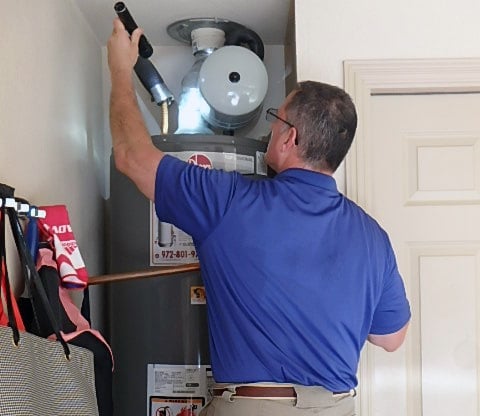For potential home buyers, the home inspection is a critical milestone on the real estate journey, especially in a tight housing market. An inspection can confirm the seller’s assertions about a house’s condition — or it can uncover defects no one knew were there, for example, pooling water, a leaky basement, or damaged roofing. The inspection’s outcomes can lead to a rapid compromise between mutually satisfied parties — or delay (or derail!) a deal.
So, it’s important that buyers understand what goes on in a home inspection. What’s covered? What’s not? What can you expect to learn?
Understanding what’s included in a typical home inspection can give you the information you need to select the best professional inspector for your situation. It can also ensure you get the most out of the home inspection process. Here are a few of the most important aspects of home inspection you should know.
What is Included in a Typical Home Inspection?
Each state in the U.S. has its own processes and requirements for licensing or certifying home inspectors and ensuring they meet state-specific home inspection standards. In Texas, professional inspectors are required to be licensed by the Texas Real Estate Commission (TREC). Earning this license indicates a certain level of education and experience and implies an inspector’s agreement to adhere to TREC’s Standards of Practice and follow its Rule of Professional Conduct and Ethics.
Here are a few important elements to understand about TREC’s inspection standards. First, TREC describes a home inspection as a “limited visual survey and basic performance evaluation of the systems and components of a building using normal controls.” Inspectors are evaluating the general condition of the home at the time of inspection, not performing a comprehensive investigation. This means they may not find or report on every single defect, and they aren’t required to document basic wear-and-tear or cosmetic issues.
TREC also specifies an inspector is only required to evaluate “accessible” systems and parts on both the interior and exterior of the home. They don’t have to climb over obstacles or move heavy objects. And they aren’t required to inspect anything on the job that poses a hazard to their safety, for example, by walking a very steep roof. As a home buyer, you should understand there are limits to what a home inspector can, and should, do.
TREC’s Minimum Inspection Requirements
What’s the baseline? TREC spells out what a home inspector is required to evaluate and document, what defects they are required to report, and what they’re not required to do for each of the following systems and parts in the home:
- Structural systems, including foundations, grading, and drainage; roof coverings, roof structures, and attics; interior walls, ceilings, floors, and doors; exterior walls, doors, and windows; interior and exterior stairways; fireplaces and chimneys; basements; and porches, balconies, decks, and carports.
- Electrical systems, including the electrical service entrance and panels; branch circuits, connected devices (including smoke and CO alarms), and electrical fixtures.
- Heating, ventilation, and air conditioning (HVAC) systems, including heating equipment; cooling equipment; duct systems, chases, and vents.
- Plumbing and water systems, including fixtures, faucets, drains, showers, tubs, water heaters, and hydro-massage therapy equipment.
- Appliances, including dishwashers, garbage disposals, range hoods and exhaust systems, ranges and cooktops, ovens, microwaves, exhaust systems and bathroom heaters, garage door operators, and dryer exhaust systems.
TREC also provides guidance for inspectors who agree to inspect optional systems, including sprinkler systems; swimming pools, spas, hot tubs, and equipment; outbuildings; private water wells; and private septic systems. The home inspector may charge a little extra to evaluate these optional systems, but it will likely be money well spent based on the investment you’re about to make.
How do the Best Home Inspectors Go Above and Beyond?
Finding a professional home inspector that meets your state’s minimum requirements is great, BUT… When selecting a home inspection company, you should also dig into how its inspectors go above and beyond the minimum requirements. In Texas, for example, TREC’s Standards of Practice state that inspectors are welcome to provide a higher level of inspection performance than the minimum requirements. And the best home inspectors will do so in a number of ways on every job.
In Texas, the best home inspectors will evaluate and report on more systems and components than TREC requires. While TREC specifies inspectors only need to test equipment and appliances in “one mode with ordinary controls at typical settings,” top-notch inspectors will delve deeper. They’ll include more observations in their final report and include numerous photographs — which isn’t required by TREC.
The best home inspectors will also offer additional specialized services, for example, the use of a thermal imaging camera to detect possible hidden electrical problems, the use of a ZIPLEVEL to help you measure and determine if the foundation is within certain tolerances, and services to identify the presence of conditions that are conducive to wood-destroying insects, like termites. These additional services may increase the cost of the inspection, but only minimally, and they go a long way to giving buyers peace of mind when deciding whether or not to close the deal.
Finally, top-notch home inspectors will spend time with you explaining the outcomes of the inspection. They’ll give you advice on how to approach repairs and how much they may cost, so you have the information you need to negotiate a good deal. These activities are not required by TREC, but they are actions the best home inspectors will take.
As a home buyer, knowledge is power. Take time to understand what a home inspection is all about. Ask how your inspector will go above and beyond the minimum requirements. And to find the most experienced, reliable professional you can find using our 13 question home inspector checklist.
In the end, you will feel prepared and not scared.





